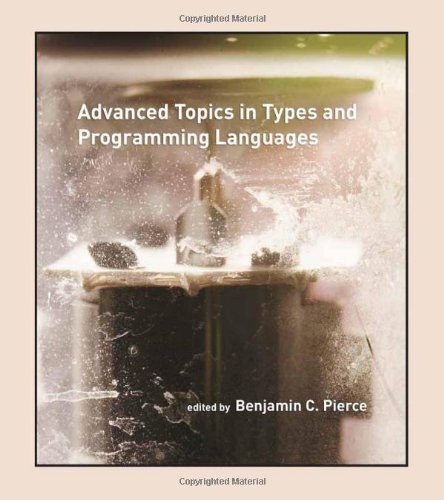Types and Programming Languages ebook
Par summerlin juan le mardi, septembre 20 2016, 06:01 - Lien permanent
Types and Programming Languages. Benjamin C. Pierce

Types.and.Programming.Languages.pdf
ISBN: 0262162091,9780262162098 | 645 pages | 17 Mb

Types and Programming Languages Benjamin C. Pierce
Publisher: MIT
Abstract: "Type systems based on intersection types have been studied extensively in recent years, both as tools for the analysis of the pure [lambda]-calculus and, more recently, as the basis for practical programming languages. Advanced Topics in Types and Programming Languages. A type system is a tractable syntactic method for proving the absence of certain program behaviours by classifying phrases according to the kinds of values they compute” (Types and Programming Languages , Pg. You must be logged in to post a comment. For me it all started when I took up TAPL (Types and Programming Languages) by Benjamin Pierce. Categories: Event, Summer School Tags: Comments (0). I find it remarkable that pretty much all commonly used programming languages gets this simple type wrong. Why can't we make them if we are so inclined? I don't disagree with it, but who has the vision of what the Haskell IDE should be? See the SICSA Summer School on Types and Programming Languages web site for further details. I have been working on developing a new type of programming language over the last few months. But that doesn't even matter – programming languages (even C) specify that their int type be binary or at least behave as such – so x&1 will ALWAYS work. Sometimes people say "Haskell is so different and advanced as a programming language, it needs a new type of editor/IDE". Got says: February 28, 2011 at 1:51 am. How can one expect a type system to be useful if it can't even infer the correct type of the most basic expressions? Why don't we have data types that are 4 bits in size? If you are a regular reader of my blog, you must be aware that one of the things that I get interest in is *types*. A type system defines how a programming language classifies values and expressions into types, how it can manipulate those types and how they interact. His papers on definitional interpreters, syntactic control of interference, practical intersection types, and Algol-like programming languages are widely cited. I have seen bit-fields, but I have heard they are not portable, and perhaps not used as well?